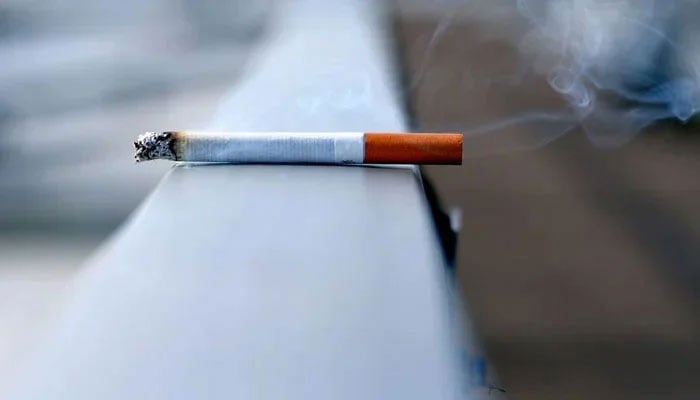95pc of children in Pakistan, BD exposed to second-hand smoking: study
High exposure of children to SHS in our study contrasts with figures from many developed countries
KARACHI: A study co-authored by researchers from the Department of Community Health Sciences and Medicine at the Aga Khan University has revealed an alarming prevalence of second-hand smoking (SHS) exposure among children in Pakistan and Bangladesh, with 95 percent of children affected.
SHS occurs when non-smokers inhale the exhaled tobacco fumes from an active smoker, highlighting the pervasive impact of smoking in environments with lax smoking restrictions.
The study’s findings, published in the Nicotine and Tobacco Research Journal, indicate an extremely high level of SHS exposure in Karachi, Pakistan, where nearly all (99.4 percent) of the children were found to be exposed to SHS, predominantly due to male-dominated smoking cultures.
The research team surveyed 2,769 children aged 9-14 from 74 primary schools in Dhaka and Karachi to assess their SHS exposure. They tested the children’s saliva for cotinine, a marker of tobacco exposure, and examined the association between adult smoking behaviors and salivary cotinine levels in children. Children living with adult smokers or in homes permitting indoor smoking had higher SHS exposure compared to those living with non-smokers or in smoke-free homes.
Dr Romaina Iqbal and Prof Javaid Khan from the Aga Khan University, Pakistan, noted, “The high exposure of children to SHS in our study contrasts with figures from many developed countries, where only a minority of children are now exposed to such risks.”
The harmful effects of second-hand smoking have been well-documented, contributing to respiratory infections in newborns, infants, and children, and increasing the risk of Sudden Infant Death Syndrome (SIDS) in those with hereditary disorders.
“These findings are alarming. If we cannot protect children from SHS exposure, they will face increased risks of respiratory infections, associated deaths, lower academic performance, and a higher likelihood of smoking uptake in later life,” said Prof Rumana Huque from the ARK Foundation, Bangladesh, and a co-author of the paper.
Prof Kamran Siddiqi from the University of York, UK, and the Chief Investigator of the study, emphasized the importance of advocating for smoke-free homes and cars, as well as enforcing smoking bans in public places, particularly those frequented by children, such as playgrounds, parks, and fairgrounds.
-
 James Van Der Beek's Friends Helped Fund Ranch Purchase Before His Death At 48
James Van Der Beek's Friends Helped Fund Ranch Purchase Before His Death At 48 -
 King Charles ‘very Much’ Wants Andrew To Testify At US Congress
King Charles ‘very Much’ Wants Andrew To Testify At US Congress -
 Rosie O’Donnell Secretly Returned To US To Test Safety
Rosie O’Donnell Secretly Returned To US To Test Safety -
 Meghan Markle, Prince Harry Spotted On Date Night On Valentine’s Day
Meghan Markle, Prince Harry Spotted On Date Night On Valentine’s Day -
 King Charles Butler Spills Valentine’s Day Dinner Blunders
King Charles Butler Spills Valentine’s Day Dinner Blunders -
 Brooklyn Beckham Hits Back At Gordon Ramsay With Subtle Move Over Remark On His Personal Life
Brooklyn Beckham Hits Back At Gordon Ramsay With Subtle Move Over Remark On His Personal Life -
 Meghan Markle Showcases Princess Lilibet Face On Valentine’s Day
Meghan Markle Showcases Princess Lilibet Face On Valentine’s Day -
 Harry Styles Opens Up About Isolation After One Direction Split
Harry Styles Opens Up About Isolation After One Direction Split -
 Shamed Andrew Was ‘face To Face’ With Epstein Files, Mocked For Lying
Shamed Andrew Was ‘face To Face’ With Epstein Files, Mocked For Lying -
 Kanye West Projected To Explode Music Charts With 'Bully' After He Apologized Over Antisemitism
Kanye West Projected To Explode Music Charts With 'Bully' After He Apologized Over Antisemitism -
 Leighton Meester Reflects On How Valentine’s Day Feels Like Now
Leighton Meester Reflects On How Valentine’s Day Feels Like Now -
 Sarah Ferguson ‘won’t Let Go Without A Fight’ After Royal Exile
Sarah Ferguson ‘won’t Let Go Without A Fight’ After Royal Exile -
 Adam Sandler Makes Brutal Confession: 'I Do Not Love Comedy First'
Adam Sandler Makes Brutal Confession: 'I Do Not Love Comedy First' -
 'Harry Potter' Star Rupert Grint Shares Where He Stands Politically
'Harry Potter' Star Rupert Grint Shares Where He Stands Politically -
 Drama Outside Nancy Guthrie's Home Unfolds Described As 'circus'
Drama Outside Nancy Guthrie's Home Unfolds Described As 'circus' -
 Marco Rubio Sends Message Of Unity To Europe
Marco Rubio Sends Message Of Unity To Europe




